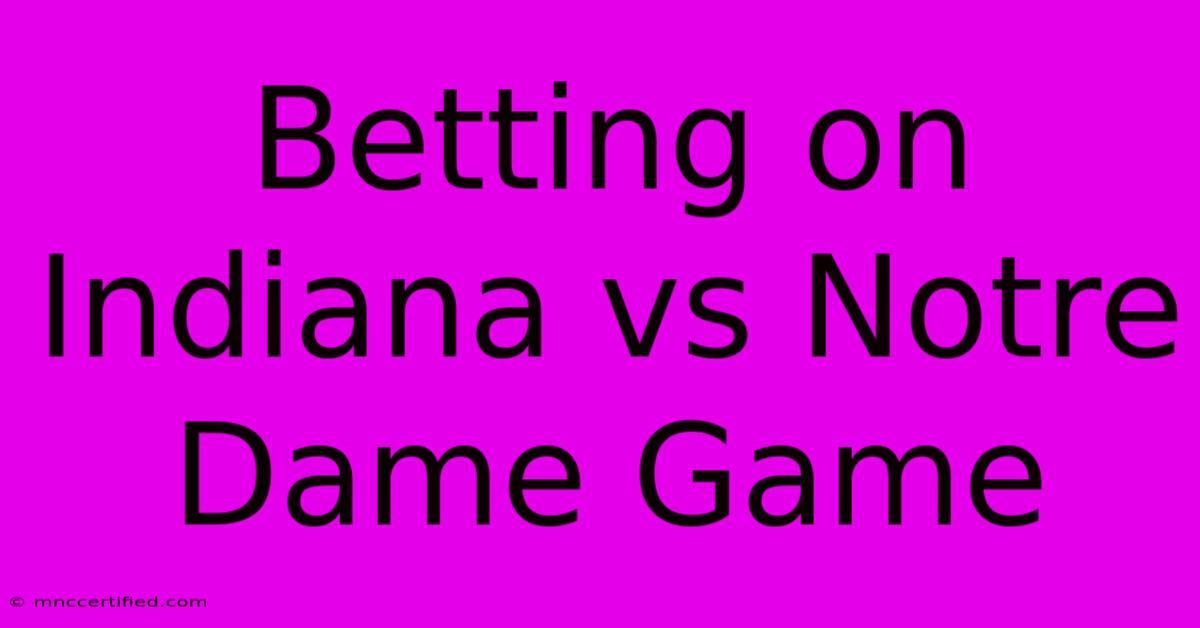Betting On Indiana Vs Notre Dame Game

Table of Contents
Betting on Indiana vs. Notre Dame: A Comprehensive Guide
The annual clash between Indiana Hoosiers and the Notre Dame Fighting Irish is always a hotly anticipated event, even more so for those looking to place bets. This comprehensive guide will explore the key factors to consider when betting on this rivalry game, providing insights to help you make informed decisions. We'll cover everything from analyzing team performance to understanding different bet types and identifying valuable resources.
Understanding the Indiana vs. Notre Dame Rivalry
The Indiana-Notre Dame rivalry, while not as historically dominant as some others, holds significant weight for both fan bases. The proximity of the two schools fuels passionate support, and the unpredictable nature of the matchup makes it an exciting betting prospect. Recent years have seen some surprisingly close contests, highlighting the inherent volatility in predicting the outcome. This volatility presents opportunities for savvy bettors.
Key Factors to Consider Before Placing Your Bet
Before you place any money on the line, thoroughly analyze several crucial factors:
1. Team Form and Recent Performance:
- Head-to-Head Record: Examining the historical record between these two teams offers valuable context. While past performance isn't necessarily indicative of future results, it provides a baseline understanding of their competitive history.
- Current Season Statistics: Look beyond just wins and losses. Key metrics such as points per game (PPG), yards per game, turnover differential, and defensive efficiency provide a deeper insight into each team's strengths and weaknesses.
- Injury Reports: Injuries to key players can significantly impact a team's performance. Stay updated on the latest injury news for both Indiana and Notre Dame before making your bet. A star quarterback sidelined or a key defensive player injured can completely change the game's dynamic.
2. Coaching Strategies and Team Dynamics:
- Coaching Styles: Different coaches employ different strategies. Understanding each coach's approach can help you anticipate how the game might unfold.
- Team Chemistry and Morale: A team with strong chemistry and high morale is often more likely to perform well under pressure. Look for news and analyses that shed light on the current team atmosphere.
3. Home Field Advantage:
Historically, Notre Dame has enjoyed a significant home-field advantage. Consider the impact of playing at Notre Dame Stadium, which can heavily influence the outcome and odds. If the game is played at a neutral site, this factor is negated.
4. Betting Odds and Lines:
- Point Spread: This represents the predicted margin of victory. A positive spread favors Notre Dame, while a negative spread favors Indiana.
- Moneyline: A straight-up bet on which team will win the game.
- Over/Under: A bet on the total combined points scored by both teams.
- Prop Bets: These bets focus on specific events within the game (e.g., total rushing yards, number of interceptions).
Carefully compare odds offered by different sportsbooks to find the best value for your bet.
Utilizing Resources for Informed Betting
Several resources can aid in your betting strategy:
- Reputable Sports News Websites: Stay informed about game previews, expert analyses, and injury updates from trusted sources.
- Advanced Statistics Websites: Websites offering in-depth statistical analysis can provide valuable insights into team performance.
- Sports Betting Forums: Engaging with other bettors can provide different perspectives and insights. However, always conduct your own research and don't solely rely on others' opinions.
Responsible Gambling Practices
Remember that sports betting involves risk. Always gamble responsibly and within your means. Never bet more than you can afford to lose. Seek help if you believe you have a gambling problem.
By thoroughly researching and considering these factors, you can significantly improve your chances of making successful bets on the Indiana vs. Notre Dame game. Remember, informed betting is key to maximizing your potential returns. Good luck!

Thank you for visiting our website wich cover about Betting On Indiana Vs Notre Dame Game. We hope the information provided has been useful to you. Feel free to contact us if you have any questions or need further assistance. See you next time and dont miss to bookmark.
Featured Posts
-
60 M Deal Walker Signs With Astros
Dec 21, 2024
-
Jamie Coutts Analyzing The Crypto Crash
Dec 21, 2024
-
Curbing Crime Nighttime Patrols
Dec 21, 2024
-
Cfp Georgia Vs Notre Dame
Dec 21, 2024
-
Six Triple Eight Review Tyler Perrys Film
Dec 21, 2024